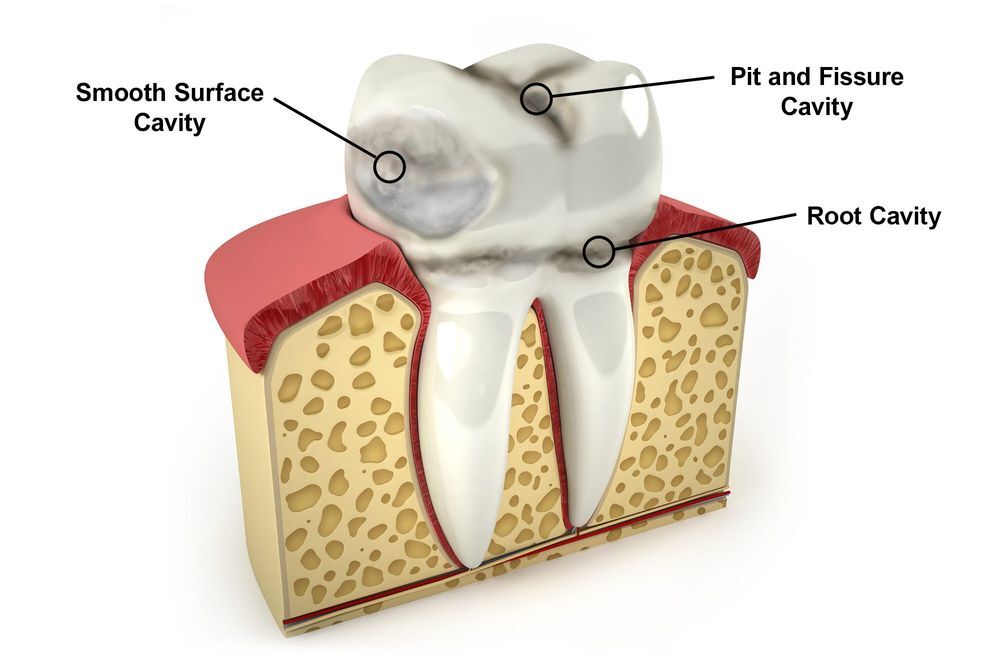Preventing Cavities Can Protect Your Smile
Dental decay can cause pain and sensitivity as well as endanger the health of your entire smile. It is essential that preventing tooth decay is a priority for all patients. At Advanced Dental Care, we educate patients about how to prevent cavities and provide services to protect teeth against decay and treat cavities that have already developed. Our doctors, W. Ashley Moorman, J. Barclay Woodward, and Bill Moorman, are dedicated to helping patients in Valdosta, GA, maintain a healthy smile they can feel confident in.

Common Cavity Symptoms
There are a variety of noticeable signs that may indicate tooth decay, including:
- Persistent tooth pain
- Sensitivity to hot and cold temperatures
- Bad breath
- Abnormal taste in your mouth
- Tooth discoloration
- Bleeding when brushing your teeth
If you notice any of these symptoms, you should contact our office as soon as possible for an examination.
How Do Cavities Form?
A cavity is another term for tooth decay. Tooth decay occurs in several steps. First, plaque builds up due to bacteria and other elements within the mouth. When it is not cleaned away, the acids within the plaque can wear away enamel, creating small holes. The acid and bacteria then continue to destroy layers of the tooth.
Dental decay can cause pain and sensitivity as well as endanger the health of your entire smile.
When left untreated, tooth decay can reach the inner portion of the tooth, causing a severe infection. At this point, your tooth may require extraction or fall out. Fortunately, actions taken by you or your doctor can help protect your teeth from cavities or treat the damage caused by decay before it reaches that point.
At-Home Cavity Prevention
There are several measures you can take in your daily routine to help prevent cavities. It is highly recommended that patients follow recommended dental hygiene practices to ensure your teeth are being cleaned properly. This typically includes brushing your teeth at least twice a day and flossing once a day.
We may also recommend certain products to improve your at-home routine, such as fluoride mouthwash. Additionally, avoiding foods and beverages with high sugar content, including soda, juice, and candy, can help prevent decay.
Preventive and Restorative Treatments
At our practice, we provide both preventive and restorative treatments to care for your oral health at all stages.
Treatments to Prevent Cavities
First and foremost, it is essential that you attend your regular cleanings and exams to allow us to professionally remove plaque and monitor your oral health. We also offer fluoride treatments and dental sealants for our pediatric and adult patients to protect teeth against cavities.
Fluoride is applied to the teeth to promote remineralization, helping to strengthen the enamel and limit the development of bacteria. In some cases, fluoride can even reverse decay. Sealants, on the other hand, are used to protect the chewing surfaces of your teeth. The thin, plastic coating is applied to the top of molars and premolars to prevent decay.
Restoring Teeth Once Decay Has Developed
Depending on the extent of decay, we can implement the treatment that offers the best possible outcome. Our restorative treatments for cavities include:
- Fillings
- Typically utilized in the earlier stages of decay, fillings are used to replace the portion of the tooth that has been affected by the cavity. We offer tooth-colored fillings composed of a composite material to blend seamlessly with the rest of your smile.
- Dental Crown
- Dental crowns are usually provided to repair teeth with more serious cavities. After the decayed portion of the tooth has been removed, the crown will be placed over the entire tooth above the gum line to protect and preserve the remaining tooth structure.
- Root Canal Therapy
- If decay has reached the inner pulp chamber of the tooth, a root canal must be performed to alleviate the infection. The dental pulp and inside of the roots will be cleaned out and replaced with a plastic substance known as gutta-percha. Often, a dental crown will be placed after a root canal.
Once decay has escalated to the point that the tooth cannot be prepared, extraction is typically necessary. However, we offer trusted methods of tooth replacement, including restorations secured by dental implants, to maintain the function and aesthetics of your smile.
Your Oral Health is Our Priority
Do not allow tooth decay to progress and lead to more extensive oral health issues. If you believe you may have a cavity, contact us online or call us today at (229) 242-4441 to schedule your consultation.


